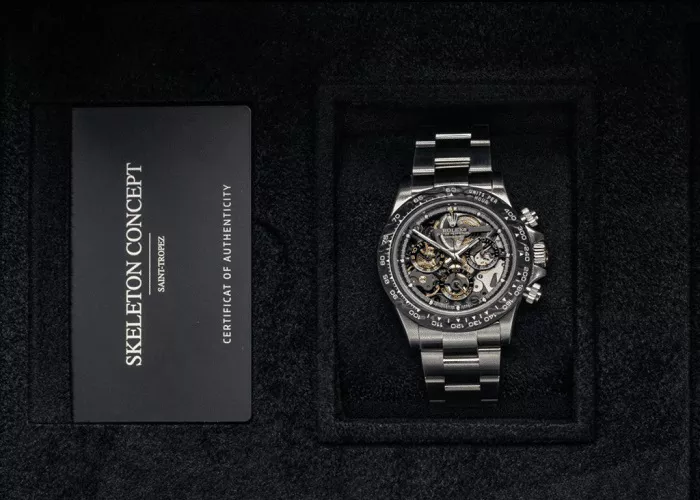A French court has ruled in favor of Rolex in a trademark infringement case against luxury watch customizer Skeleton Concept. The Paris Judicial Court, in a decision earlier this year, found Skeleton Concept guilty of violating Rolex’s trademark rights and engaging in unfair competition by making extensive alterations to Rolex timepieces beyond acceptable personalization.
The court ordered Skeleton Concept to pay €710,000 in damages to Rolex SA and Rolex France for its actions. The lawsuit was filed in 2022 after Skeleton Concept continued to customize Rolex watches despite receiving a cease-and-desist letter. The company argued that it was simply altering watches already owned by customers and not selling them under the Rolex name.
Skeleton Concept’s customizations were not limited to minor changes; they included deep modifications like engraving sapphire glass, cutting internal components, and drilling into dials. This approach, Rolex argued, misled consumers and compromised the brand’s reputation for quality and origin.
In its defense, Skeleton Concept claimed that Rolex’s trademark rights were exhausted since the original watches had been sold with Rolex’s consent. However, the court rejected this argument, ruling that even if the trademark had been exhausted, Rolex had a legitimate reason to object to such extensive alterations.
The court emphasized that altering the watches to this degree could mislead consumers into believing the modified timepieces were approved or manufactured by Rolex, which undermines the brand’s ability to guarantee the product’s origin. The court also took issue with Skeleton Concept’s use of Rolex’s trademark on social media and its own “V Concept” trademark alongside the Rolex name on customized pieces. The court ruled that this could confuse the public into thinking there was a partnership or endorsement by Rolex, even though Skeleton Concept had posted disclaimers on its website stating its lack of affiliation with the brand.
Furthermore, the court found that Skeleton Concept violated the French Consumer Code by removing Rolex’s name from dials and re-engraving it onto altered parts. The company was also penalized for falsely labeling its products as “Swiss Made,” despite making the modifications in France.
Taking into account Skeleton Concept’s reported annual turnover of €3 million, the court awarded Rolex €600,000 for trademark damages, €100,000 for moral harm to the brand, and €10,000 for unfair competition related to the “Swiss Made” mislabeling.
While the court sided with Rolex on most issues, it dismissed claims of parasitic behavior against Skeleton Concept, finding that its social media reposts of Rolex content were insufficiently specific to constitute unfair competition.
This ruling reflects a broader trend in legal decisions, particularly in the luxury sector, where brand origin and authenticity are vital to maintaining value. The case highlights the legal boundaries regarding product customization, especially when it comes to significant alterations that could damage a brand’s reputation and trademark rights. The decision also raises important questions about what constitutes a “legitimate reason” for opposing resale and what evidence is required in cases involving trademark exhaustion.
Related Topics:

